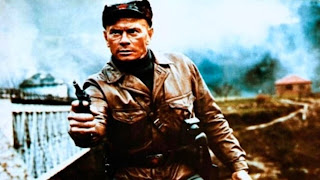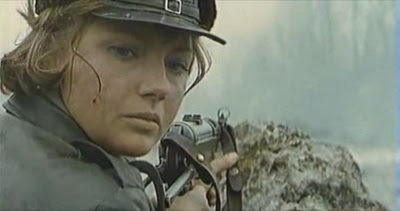A Bridge Too Bad.
I’ve only once been forced to watch a film at gunpoint.
It took place in the early seventies, in what was then Yugoslavia; specifically Croatia, where firearms were soon to be commonplace. At the time, however, life was good along the Dalmatian coast and even better in Pula’s Roman amphitheatre (above) during the annual Pula Film Festival.
A good crowd, including a dozen film journalists, had gathered under the stars to watch Bitka na Neretvi or Battle of the River Neretva, climax of that year’s event. This three-hour saga celebrated the greatest wartime achievement of Croatia’s finest son, former Communist partisan and now president of his country, Marshal Josip Broz Tito.
In fact, we were there less to see the film than Tito himself, making a rare foray away from his private island. As a bonus, his guests were Italian cinema’s uncrowned king and queen, producer Carlo Ponti and his wife Sophia Loren.
Truth to tell, none of we critics perched uncomfortably on the slatted garden-type wooden benches expected to see the whole film. Having gawked at the Strong Man of the Balkans, we intended to slip away for a more agreeable evening in town.
 |
| Loren, Ponti |
The official party swept in only half an hour late. A surprisingly short Tito led the way in an ice-cream uniform festooned with gold braid, accompanied by the roly-poly Ponti, with a queenly Sophia, a good head taller than both men, on his arm. As the applause died and the title music blared, we rose and inched our way towards the aisle.
But the first to arrive at end of the row found himself facing a young but determined soldier with a well-worn but no doubt serviceable machine gun. None of us knew Croatian and he spoke no English, nor did he need to. His weapon was eloquent. Much waving of press cards and passports had no effect. Nobody, it seems, walked out on the Marshal’s movie – which, with no alternative, we settled down to watch.
From the start, the film breathed the sense of laboured compromise that characterises co-productions. Josef von Sternberg, who’d tried epics with The Scarlet Empress and an aborted version of Robert Graves’s I, Claudius, once said of a screenplay produced in the same spirit “Not only had everyone had his finger in the pie. A number of them had immersed various parts of their anatomy in it.” He could add Bitka na Neretvi to his list.
You could, however, sympathise with this film’s committee of screenwriters. Wartime Balkan politics were intricate, with various groups jostling for power; the Serb separatist Ustashi, the Fascist Chetniks, Tito’s Communists, not to mention the Germans and Italians, some of whom, like Franco Nero’s tank commander, confused things still more by switching sides.
The film was produced and partly written in Rome, and cast from that Foreign Legion of actors who drifted from Paris to Vienna to London, ready at a moment’s notice to don a Roman toga, Nazi uniform or Regency court dress. Any of them could have played these characters but the roulette wheel of chance gave us Americans Orson Welles and Yul Brynner (left), Russian Sergei Bondarchuk, Germans Curd Jurgens and Hardy Kruger, Italian Franco Nero, and – the only actual Yugoslavs among the leads – Milena Dravic and Sylva Koscina.
For regular screenings in the ampitheatre, translations are transmitted to earphones from caravans behind us. Tonight, however, they are replaced by the dais where Tito and his guests sit enthroned. Ignorant of Croatian, we flounder on an ocean of language. Jurgens and Kruger play Nazi officers. Welles, fitted with an unfortunate toupee and housed in a tent-like double-breasted suit, impersonates a Chetnik senator – effectively, it seems, since his appearance triggers a barrage of hisses. Sergei Bondarchuk, included to guarantee the Russian audience, (and who, as the director of the majestic Waterloo, could, like Welles, have managed this farrago with greater skill and authority than the committee of Croats in charge), is a loud-mouthed partisan. As the only performer of undiluted British stock, Scots actor Anthony Dawson naturally plays an Italian.
 |
| DOP Tomislav Pinter, Orson Welles |
Tito himself doesn’t appear in the film. Instead, like Christ in a religious epic, he’s shown as a shadow or a distant heroic silhouette. According to gossip around the bars, he wanted Kirk Douglas to play him and, when Kirk declined, decided nobody else would do.
Elements of the Yugoslav army in Wehrmacht grey pour over a hill, preceded by an artillery barrage that, if real, would have ended the war right there. Yul Brynner, ordered to deny Curd Jurgens’ army a means of crossing the Neretva, mines the bridge and blows it to hell. The audience roars. But wait! The Nazis are not on the other side of the river at all, but up the partisans’ rear. Fortunately, Yul has done such a poor job that his people can inch across the tottering bridge before he blows it up again.
The credits start to roll. Now can we leave? Apparently not. Only when Tito and his guests depart will the soldiers lay down their arms.
A year later, back in London, an editor friend called.
“You go to these film festivals,” he said. “Ever heard of a thing called...” He paused to consult the label on the can. “Bitka na...”
“...Neretvi,” I supplied. “Yes, I know it. Why?”
He had been tasked with cutting it down for the US drive-in market.
“There’s Orson Welles with a bad haircut,” he said, “and Yul Brynner, but there doesn’t seem to be a star. I can’t make sense of it.”
“You never will,” I said. “The tank battles aren’t bad though.”
 A 102-minute version did emerge with a new Bernard Herrmann score. To show Communist solidarity, Pablo Picasso contributed a poster (left). The edited version, long on battles, short on characterisation, is, on the intricacies of Balkan politics, happily opaque. Given the carnage that followed Tito’s demise in 1980, my memory of that young soldier with his machine gun seemed a shadow of things to come.
A 102-minute version did emerge with a new Bernard Herrmann score. To show Communist solidarity, Pablo Picasso contributed a poster (left). The edited version, long on battles, short on characterisation, is, on the intricacies of Balkan politics, happily opaque. Given the carnage that followed Tito’s demise in 1980, my memory of that young soldier with his machine gun seemed a shadow of things to come.



No comments:
Post a Comment
Note: only a member of this blog may post a comment.